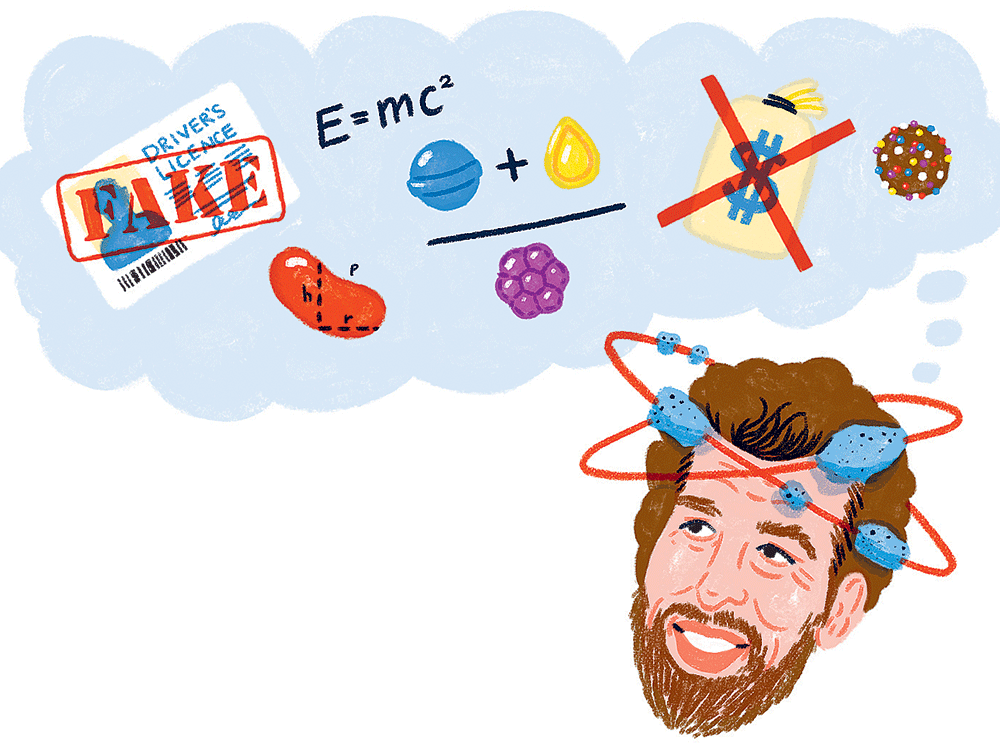Why Being a Genius Isn’t All It’s Cracked Up to Be
As genius Rick Rosner explains, a high IQ can be a curse as well as a blessing.

The Trials & Tribulations of Being a Genius
History remembers moments of genius. Isaac Newton saw an apple fall to the ground and formulated his theory of gravity. Archimedes was taking a bath when he had his eureka moment: water displacement can measure the purity of gold. But over the past 10,000 years, humans have experienced approximately a quadrillion run-of-the-mill moments, which is a really lousy ratio of genius to not-genius moments. The fact is, the world is set up for non-Einsteins.
My mom was aware of this. She freaked out when I taught myself to read at age three. But while I crushed IQ tests, I was a playground loner and the target of projectiles. Me, at age six: “Here comes a rock, thrown by a bully on the other side of the chain-link fence. The fence is divided into squares that are only slightly larger than the rock itself. The odds that the rock won’t be deflected by the fence are negligible, so I don’t have to duck.” Then the rock passed clean through the fence and clonked me on the head.
As with most people with genius IQs, my social skills needed work. I addressed this problem after college by getting a job as a nightclub doorman. I became obsessed with IDs, spending years developing a statistical algorithm to help me spot fake or borrowed cards with 99 per cent accuracy. But after a decade of research, I was still getting paid $8 an hour.
When I was a writer for the quiz show Weakest Link in 2001 and 2002, we had a quota of 24 questions a day. This didn’t seem like enough for someone with my big genius brain, so I set my own quota of up to 100 questions a day. I didn’t know that my bosses were evaluating us based on how many of our questions were rejected. Writing three times as many questions as everyone else, I consistently landed at the top of the list and was fired.
I studied for almost a year to get on Who Wants to Be a Millionaire. For my $16,000 question, taped in July 2000, Regis Philbin asked me, “What capital city is located at the highest altitude above sea level?” I answered, “Kathmandu.” Millionaire claimed the correct answer was Quito. However, the world’s highest national capital is generally considered to be La Paz, which wasn’t included among the possible answers. I sued the show, backing up my claim by comparing my question with more than 100,000 other Millionaire questions. I eventually lost—it turns out judges don’t have much patience for quiz-show lawsuits.
Not everything has backfired because of my genius. I’ve had a 25-year career as a comedy writer on TV shows such as Jimmy Kimmel Live. I have a lovely wife and daughter. And having earned 12 years of college credits in less than 12 months and graduating with five majors, I’m always able to help with homework when needed.
In 20 years, my mental power will be commonplace. Thanks to our increasingly brilliant devices, we’ll all be geniuses, with every shred of information in the world at our fingertips. And just like me, you’ll use your vast computational resources to do mostly dumb stuff. See you at the 2036 Four-Dimensional Candy Crush Championship, everybody!
Want more from our Department of Wit? Read Age by Design.



